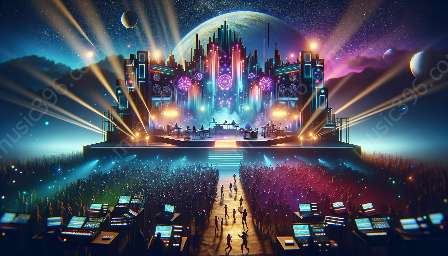Electronic music has been deeply influenced by politics and social movements throughout its history, shaping its development, culture, and identity. This exploration will delve into the intertwining roles of politics and social movements in the evolution of electronic music and how DJs have played pivotal roles in this dynamic landscape.
The Birth of Electronic Music and its Political Context
The roots of electronic music can be traced back to the mid-20th century, emerging alongside the political and social upheavals of the time. The rise of post-war counterculture, civil rights movements, and political activism set the stage for a new form of sonic expression that challenged conventional music norms. The experimentation with electronic soundscapes reflected the desire for creative freedom and resistance against societal norms.
Electronic Music as a Reflection of Sociopolitical Change
As electronic music continued to evolve, it became a reflection of sociopolitical change, mirroring the shifting landscapes of protest, social movements, and cultural rebellion. Genres such as techno, house, and drum and bass emerged as soundtracks to political resistance, offering a sonic platform for marginalized voices and dissenting perspectives. The aesthetics and ethos of electronic music scenes became intertwined with political activism, shaping subcultural identities and fostering community solidarity.
Political Influences on Electronic Music Production and Distribution
Politics have also had a profound impact on electronic music production and distribution. The advent of digital technologies and the democratization of music creation were deeply influenced by political and legislative decisions related to copyright, intellectual property rights, and internet governance. The proliferation of independent labels, underground clubs, and DIY music movements has been shaped by the political climate, with artists and DJs actively engaging in discussions about artistic freedom, censorship, and the commodification of music.
DJs as Cultural Curators and Activists
DJs have played a pivotal role in shaping the sonic landscape of electronic music and acting as cultural curators and activists. Through their craft, they have introduced audiences to diverse sounds, promoted underground artists, and amplified social and political messages. DJ sets have become platforms for cultural exchange and collective experiences, transcending geographical and political boundaries to create inclusive spaces for diverse communities.
The Role of DJs in Amplifying Social Movements
DJs have leveraged their platforms to amplify social movements and address critical issues. From benefit events and fundraisers to awareness campaigns and advocacy, DJs have used their influence to support social causes and challenge systemic injustices. Through their music selection and performances, they have fostered conversations, spotlighted marginalized voices, and catalyzed collective action, demonstrating the transformative power of electronic music in shaping social consciousness.
Navigating Political Challenges in Electronic Music
Electronic music continues to navigate political challenges, including issues of representation, cultural appropriation, and the commercialization of subcultural movements. DJs and artists are engaging in dialogues about inclusivity, cultural heritage, and ethical practices, seeking to create more equitable and socially responsible spaces within the electronic music industry. By addressing political challenges, they aim to uphold the integrity of the music and its connection to broader social movements.
Conclusion: The Interplay of Politics, Social Movements, and Electronic Music
The impact of politics and social movements on electronic music is undeniable, shaping its identity, ethos, and cultural significance. DJs have emerged as influential figures in this landscape, utilizing their platforms to amplify voices, challenge norms, and foster community engagement. As electronic music continues to evolve, its relationship with politics and social movements will remain an integral aspect of its cultural fabric, reflecting the ever-changing dynamics of global sociopolitical landscapes.


